An NYU Shanghai Student and the Pursuit of Happiness
Is happiness merely an unobtainable construct? Are we all supposed to be sad? There has to be a way to be happy...right?
Welcome to the pity party. Or, as some might call it, a Tuesday.
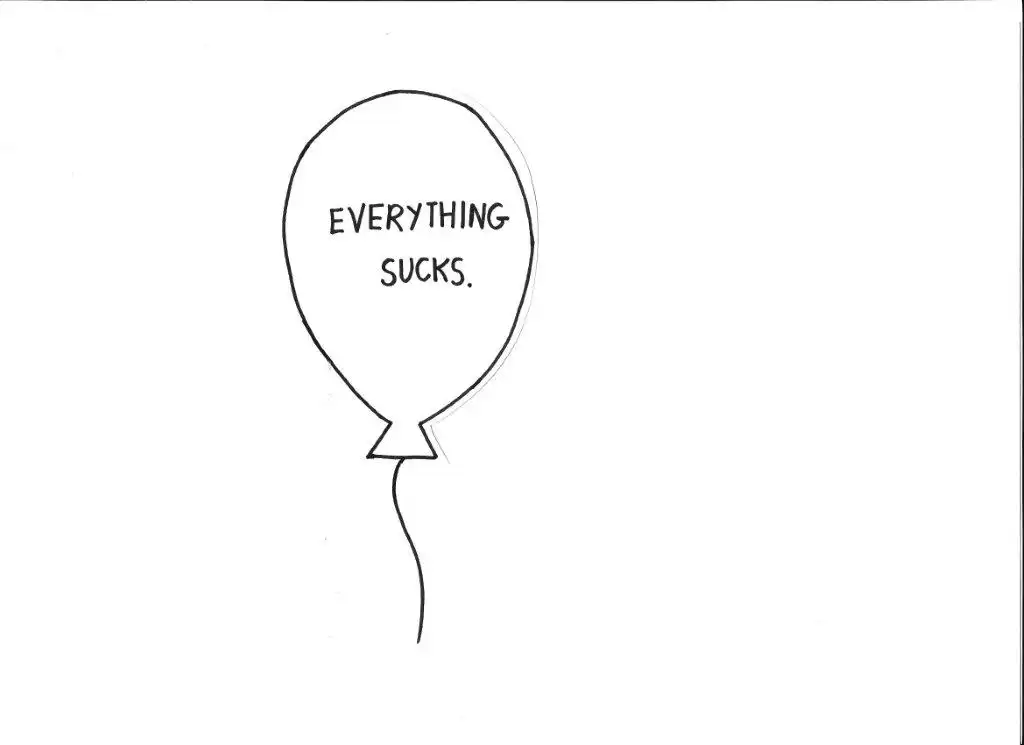
It went down like this. I spilled cappuccino on my crotch, resulting in an extremely unfortunate (and incredibly visible) stain situation. Why me?! I went on the Tube and a toddler spat on my shoe. Everything sucks. I tried to apply for a visa, but NYU Shanghai bureaucracy made me want to throw my laptop out of the window. It’s not fair. I trapped my thumb in a vending machine and now it stings when I bend it. URGH!It’s funny, but a while ago I realised that my entire life had become a succession of these moments. I was either angry, frustrated or annoyed. There was always a problem. Always an issue. Always a spiral to spin down or a black hole to get sucked into.
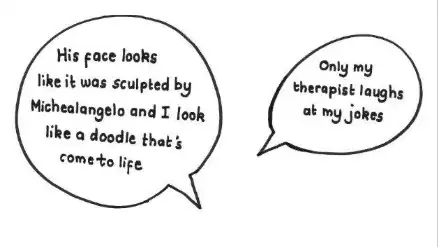
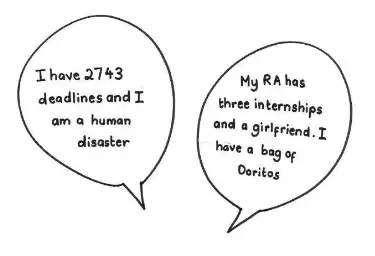
And I wasn’t the only one. I noticed a trend of people complaining and fretting and criticising themselves and, not to be too melodramatic, but it broke my heart. I have never met a more tolerant, understanding, diverse, empowered group of people than those I have met at this school. I thought to myself, if anyone deserves to be happy surely it’s these majestic unicorns who fight tirelessly against hummus dissipation, organise blackouts and write poetry.
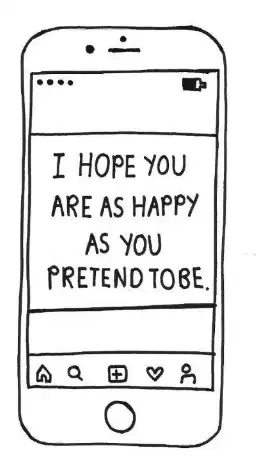
It’s sad to me how we live in a society where it’s acceptable to be sad, as long as it’s not too sad, and typical to feel bad about ourselves. Yeah, I had a sketchy adolescence that makes for some sorry stories, but I suspect that’s not a unique narrative - there’s a certain something that causes a person to ‘randomly’ tick a box and flee to China. Not always, but sometimes. And sure, there are plenty of reasons to be mad. A tangerine nightmare might actually govern the U.S.. Brexit. ISIS. People dying and suffering for no fucking reason. Taylor Swift. But if we let the hate consume us, isn't that letting evil win? Surely, being content with yourself doesn't have to mean you are content with everything else. Or is happiness merely an unobtainable construct? Are we all supposed to be sad?
*******
So enter Positive Psychology. In a (hilarious) TEDtalk, Shawn Achor, an American happiness researcher, talks about The Happiness Advantage. He discusses how the lens through which our brains view the world shape our reality and since the majority of information we gain (the news) is negative, we start to think that is the correct ratio of negative to positive. In situations (like being accepted into an awesome school) people focus not on the privilege of being there, but the competition, the stresses, the workload and the hassles. All this is terribly important because predictions of happiness are actually 10% external and 90% internal (the way which your brain processes the world). In fact, only 25% of job successes can be determined by IQ. The other 75% can be contributed to optimism levels, social support and the ability to see stress as a challenge and not a threat. A positive brain is linked to higher intelligence, increased creativity and more energy. If, at this point, you’re thinking ‘Steph, you bourgeois pre-yuppie, happiness isn’t very millennial of us,’ I hear ya. Perhaps being gloomy helps with your everything-is-fucked aesthetic and you’re destined to scroll through nihilist memes and drink black coffee whilst you write poetry about a girl you saw one time. Or maybe you sold your soul the day you committed to Grad School and an impressive GPA is all you need to become a cog in the corporate machine ($$$). Being happy is so blah when you could sacrifice the emotion all together and be successful. The problem is we continually change the goalposts of what success looks like. I got into NYU Shanghai, yay, but now I need to take good classes. I got good classes, yay, but now I need good grades. Now I need an internship. Now I need bae. Now I need better grades. Now I need an instagrammable collection of multilingual buddies and a job at Google. Now.. Now. Now. It’s exhausting.

We end up pushing happiness over the cognitive horizon, which is inadvisable because the brain works in the opposite order to how we approach our lives. Success doesn’t lead to happiness, happiness leads to success. And realising this is kinda great because it’s possible to reverse the formula. Apparently in just twenty one days a person can retain a pattern of positivity. It’s science.
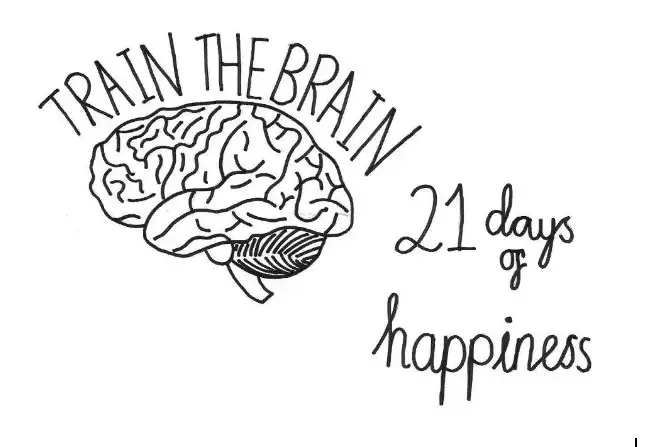
So I started a project to see whether I could increase my happiness. But truth is I feel silly writing this down because it seems ridiculous - harsh even - to be aware of my many manyprivileges and to say that I’m not sure whether I’m happy. I live in one of the greatest metropolises, with travel, luxury and limitless learning on my doorstep. Objectively I am the luckiest girl in the world, I should be happy, but I feel increasingly like life is repeatedly punching me in the face, then kicking me, as I lie, mangled, on a metaphorical bed of broken dreams and poor choices.Well, bollocks to that.

The first step is to write down three gratitudes a day. According to The Upward Spiral, feeling grateful activates the brain stem that produces dopamine, boosting the neurotransmitter like the antidepressant Wellbutrin. Thinking of things you are grateful for also increases serotonin production, like Prozac. So, not only do you get to be happier, you get to do so without the assistance of pharmaceutical companies. The Upward Spiral specifies that it’s not finding gratitude that is most important, it’s remembering to look for it, which is a sign of emotional intelligence. Gratitude also helps maintain and enhance relationships. There’s so much psychological evidence to support this, I’m surprised I only just discovered it. The best method? Take ten minutes before you go to bed and write down three things that went well in the day and why. That’s it.I loved how simple this was. At first I felt awkward and ended up being a little too grateful for Nicki Minaj, but it got easier and it was nice to think ‘yeah, I may have coffee splodges seeping through my pants, but my sister is pretty rad and that assignment went surprisingly well.’

The second step is journalling. Unsurprisingly, I am partial to writing stuff down, but usually anxiety clouds my entire writing process and I end up editing out parts about myself I think people might dislike or find controversial, boring or trivial. I never write without a motive. Research shows that ‘expressive writing’ betters health, helps people cope with loss and aids the articulation of complex ideas. Even blogging is therapeutic. Although the best thing about journals is that you don’t have to feel over everyone else’s internet. Nor do you have to be poetic or submit them to Turnitin. You get to be self-indulgent and validate how you feel, typos and grizzly grammar included.
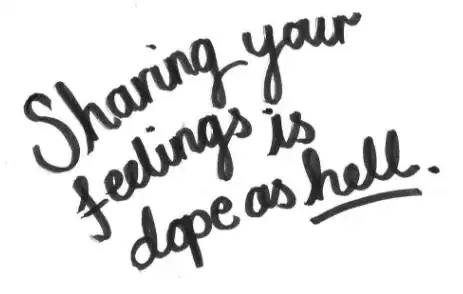
Because, in the words of designer and illustrator Timothy Goodman, sharing your feelings is dope as hell. (And [guys, specifically you] if your friend, sister, roommate, bonk-buddy, tortoise or whoever don't think so, perhaps they're not worth the effort...)Here, I thought a lot about the hierarchy of needs and how ‘low’ down social interaction, friends and family are on the pyramid. Through my research the same sentiment was repeated: Relationships make you happy. The longest study on happiness says so. The How of Happinessrecommends hugging. The Upward Spiral says that touching someone you love literally reduces pain.
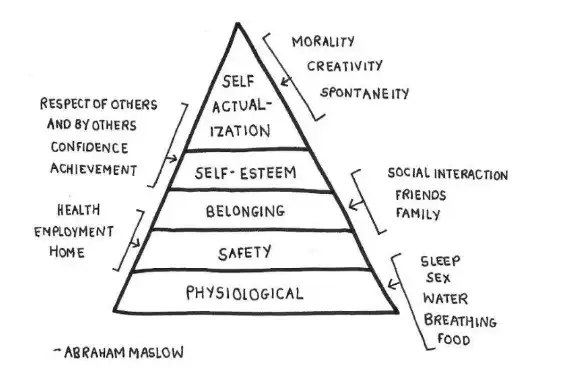
I also started to consider whether the root to happiness is a relationship. Admittedly, I often wonder if I’m just lonely, but I can’t help but feel if we stopped romanticizing the idea of becoming so dependant on someone else we can’t function adequately without them, society might be a nicer place. So maybe I’ll meet another person and we’ll become invested in each other’s lives and slowly fall in love and maybe that will make me happy and hopefully I’ll make the other person happy too. I just don’t want that to be the only reason I am happy, because that’s actually rather sad.
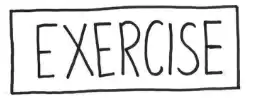
The third (and scariest step) is exercise. It’s to do with the ole “exercise releases endorphins and endorphins make you happy” spiel. Our brain chemistry is greatly affected by exercise, despite my resistance to the science. So I decided to do the 7-minute workout because The New York Timesrecommended it, but mostly because it was seven minutes. I also walked everywhere I could walk and took the stairs everywhere that had stairs. My disgust of exercise prompted me to do some alternative research into why the pursuit of happiness is a load of garbage. So I read a piece about America’s obsession with happiness. Truth is I had become a little obsessed. I watched this film, read this Tumblr, read this blog, read this book of this movie and this scathing article when I realised the movie sucked. I began to wonder if my newfound desire to be happy stemmed from my increasing Americanisation, and that was a scary thought. Is attending an American institution the same as being subliminally targeted to appreciate mindfulness and journeys of self-actualisation?
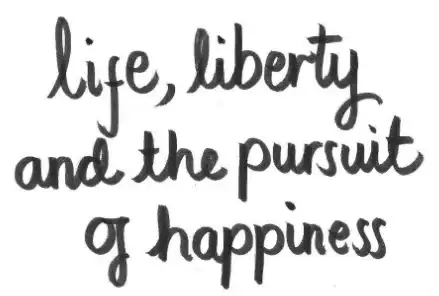
The article, which is pretty much a summary of this book, said that “the default British mindset is cynicism,” so I immediately liked it. British people are typically skeptical and pessimistic and if I wasn’t so curious I would have rolled my eyes at the whole concept of this piece. Interestingly though, the author had some insights further than being a broody Brit. She assessed how in the U.S., happiness has become a trophy for the “ultimate overachiever” and the commercialisation of being happy is as fake and superficial as everything else. She also looked at research that indicates the more people that seehappiness as a goal, the more unhappy they are - a phenomenon I’m pretty sure I started experiencing.

The final step is meditation. I’ve always secretly wanted to see what was up with The Mindful Revolution, but the closest I got was a Health and Wellness seminar which I attended because I was too hungover to consider an alternative lunch. I did a little research on how the heck a person meditates and after many failed attempts I think I almost managed it. Results being (predictably) relaxing.But when I wasn’t thinking about nothing I thought about an exhibition I had read about called ‘The Happy Show,’ in which Stefan Sagmeister, one of my favourite graphic designers, highlighted the levels of happiness.

It makes a lot of sense to me why people chase momentary highs because things like new shoes, new clothes, cosmetics, drugs, hook-ups, cars, sparkles and gateau are all instantly gratifying. They feel good - until they don’t and we have to do it again. (Guess that’s how capitalism works). Leveling up to medium and long term happiness takes effort and forward thinking. Blurgh to that, right?I think I learned a lot from this project. The psychological tricks were cool and I’m fairly certain they actually started working, but (like many things in the world) I think the most powerful step was awareness. I started to question what happiness is and who deserves it and highlighting areas in society and my own life where happiness is ousted in favour of something else. There are so many injustices in the world, being happy makes me feel like a dick. I’m frequently tempted to quit everything and go live in the woods. However, life is rather short. I don’t want to be a sucker wasting it waiting for whatever is next and I don’t want other people to either. So have that goddamn glass of wine. Call your mother. FaceTime your friend. Draw something. Cry. Smile. Kiss that person you’ve always wanted to kiss (with permission, don’t lunge). Make a snack. Write it down. Breathe. And ask yourself: What makes me happy?
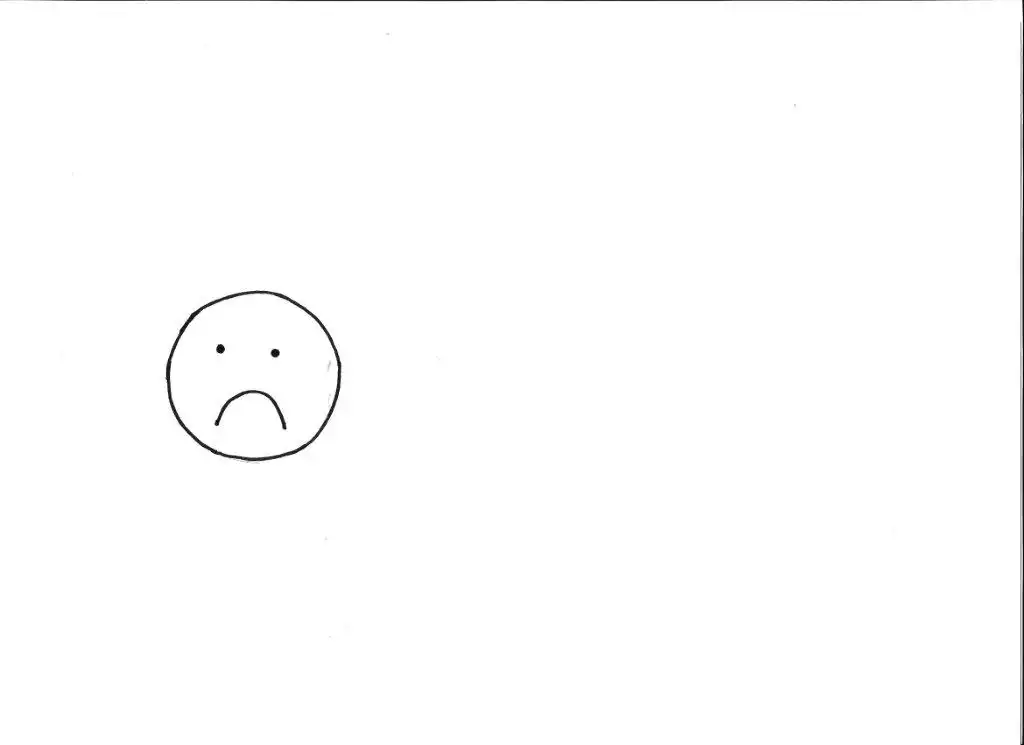
This article was written by Stephanie Bailey. Please send an email to managing@oncenturyavenue.com to get in touch. Photo Credit: Stephanie Bailey